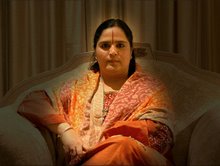The wind beneath my WINGS
Source - Indian Express, The turmoil is evident. Both inside and outside. Blasts creating an unrest nationally, the want for power forming its nest of insecurity in the mind and the unjust social pressures eating up the system...amidst the chaos, we've neglected the basic: "The plight of the building blocks - women, the today and tomorrow of our society," says Anandmurti Gurumaa, as she greets turns the pages of her book 'Shakti, The Feminine Energy'. It was at the book launch in Panchkula that we got to go beyond the cover. "This is a tribute to women and will help them discover the power and grace within," says Gurumaa, who feels that despite the 'modernism', women are still not enlightened enough and are mentally, physically and intellectually dependent. "They still have a long way to go. They need to walk the path of self healing and should understand that they have a right to live life their own way." Women, she feels, need to stand up and voice out their rights and expand their horizon to achieve holistic fulfillment" And for this, she needs to be educated, aware, have the ability to make decisions," Gurumaa's remedy lies in yoga, meditation and chanting mantras, not for God, but for the self. "For they have the precise structure to heal the mind and build on concentration," Gurumaa reveals the secret to inner peace. Talking about the inherent power of women and the misconceptions conditioned by the society, the men, she reflects too need to undergo a change of perspective. "Rather than asking women to dress in a particular manner, men should change the way they look at her. Instead of suppressing her thoughts, men should just concentrate on their own," this, she says, is for the benefit of the man. "A free mind makes for a happy woman and a happy woman, a happy family," her logic is crystal clear. Stability of the mind is of utmost importance, she asserts. Switching from subjects as varying from Zen, Sufi, Upanishad, Buddhism, to bard sages, philosophy, art, history, and yoga, Gurumaa speaks to the modern mind using ancient wisdom such as the vedas, sufism, and Buddhism. "Upanishads hold answers to today's problems and states what we need to do today -- give the lady her wings and let her be free and see the nation progress with her."











